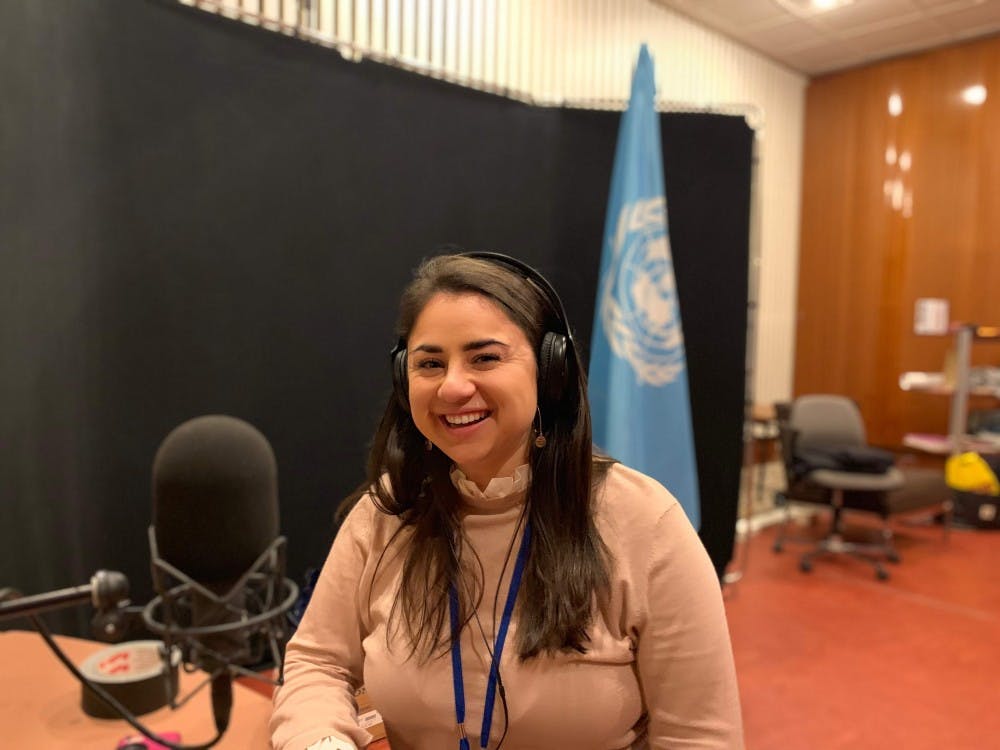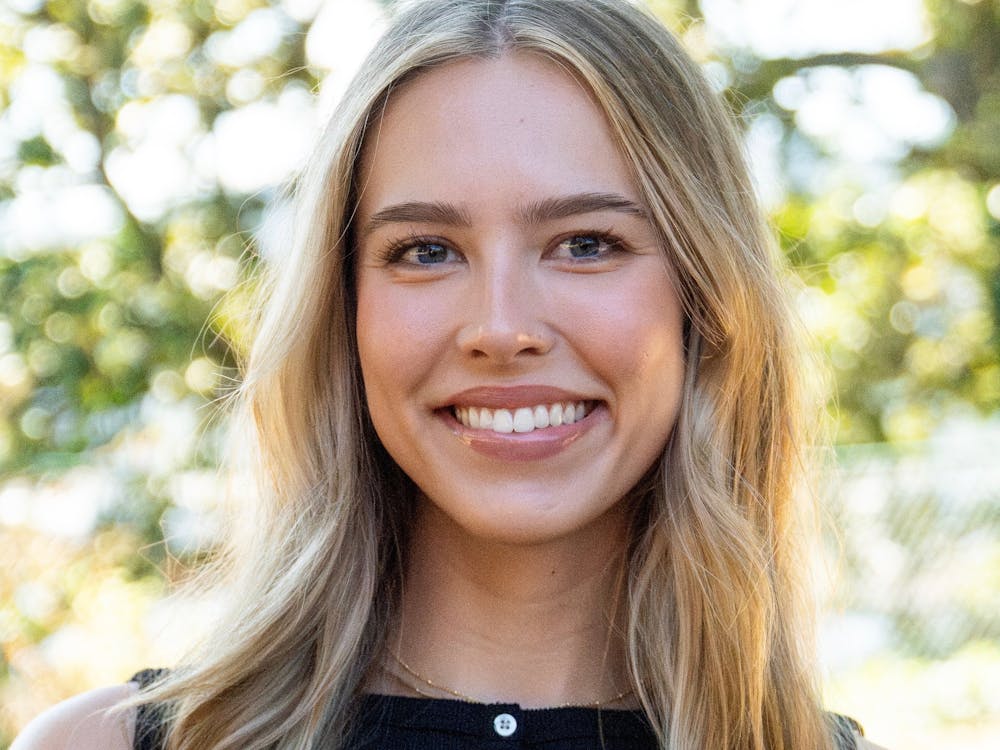My name is Olivia Sanchez and I want to talk about the recently published article about conservative students sharing their campus experiences. I spent my last two years at the University of Portland working as The Beacon’s opinions editor and then news and managing editor. Last year I wrote about what happened at the Wally Awards. In June, I will graduate from the University of Oregon School of Journalism and Communication with a master's degree in journalism. While I was at The Beacon, I reported on changes to DACA, the coming out experiences of LGBTQ+ students and national changes to Title IX.
I was part of the team of student journalists at The Beacon covering the 2016 presidential race when Donald Trump was elected. And I was shocked when he won. But here’s the thing: I shouldn’t have been. If there were enough people to elect him, I should have been able to see it coming. But I didn’t because everyone I had surrounded myself with, everyone I was in dialogue with, was seeing the world from a similar perspective. I was shocked because I was living in an echo chamber.
As I understand it, the recent Beacon article about the experiences of conservative students was an attempt to address this issue. It fell short, but we still need to talk about it.
I’m not an expert, but I’ve done my reading: Conservatism is a complex term. It’s a social and political philosophy that tends to favor tradition and is skeptical of change. There are several different strands of conservatism. For example, you have libertarians, neoconservatives, religious conservatives and fiscal conservatives, to name a few. Conservatism isn’t a political party. Being conservative doesn't necessarily mean you're also a Republican, and it doesn't automatically make you a Trump supporter. Some people have argued that Trump isn't even a conservative. Conservatism is a nebulous term that loosely suggests maintaining tradition but is difficult to concretely define.
It is hard to nail down exactly what conservatism is, but there is one thing we know for sure: Conservatism is not an identity.
Conservatism is not an identity like race or gender or sexuality or religion. Presenting conservatism as an identity reinforces the idea that holding certain political opinions puts you at risk for the same type of systemic oppression that people within marginalized groups experience, in the real world or on campus. It doesn’t.
Regularly in the United States people are killed because of the color of their skin or their gender identity. Hate crimes are on the rise. There are still a lot of states where you can be fired from your job for being gay. People are discriminated against daily for the way they pray, the languages they speak and the bodies they were born into.
As we push forward in this conversation about the experiences of conservative students in the classroom, we need to be very careful not to equate their experiences to those of students of color, queer students, immigrant students, disabled students or students from other marginalized groups.
We can talk about the divisiveness and polarization of college campuses and the problem it is creating in the classroom without painting anyone as a martyr. There is a way to incorporate conservative voices into the narrative without treating them like a persecuted second class.
As you probably read in the article, 13 percent of UP’s campus identifies as conservative or very conservative, which is slightly lower than the national average. Although this seems to be a new conversation at UP, we are not the only community grappling with this. And although the issue has been more prominently covered since the 2016 presidential election, that’s not when it started. The Daily Trojan, the student media outlet at the University of Southern California, wrote about it in 2012 after GOP presidential candidate Rick Santorum made a comment about it before the primary.
As you can see, many publications have attempted to highlight this complicated issue. We are not alone in trying to talk about this and make the situation better. It's on the minds of a lot of people, and we stand together in trying to salvage intellectual debate in the classroom and truly cultivate campus experiences where everyone feels like their voice can be heard.
The first paragraph of the story explains that UP is located in one of the most liberal cities in the country, but it fails to discuss that UP is associated with a traditionally conservative religious institution, the Catholic Church, the culture of which is pervasive throughout all aspects of life on The Bluff. This dynamic makes some aspects of our campus environment more conservative.
The title of this article, “They don’t let me finish my sentences,” refers to the most important part of the piece — the fact that intellectual debate is stifled when students with conservative opinions are uncomfortable or unable to speak up in the classroom.
The environment needs to change. Conservative students should be able to feel comfortable sharing their opinions in class. People who don’t see themselves as conservative should be asking themselves — what are we doing or saying in class to make them feel they cannot?
The best part of college is intellectual debate. If you disagree, what are you doing here? Much of the growth that matters happens in the classroom, in conversation with our peers. When some students don’t feel comfortable voicing their opinions, intellectual debate suffers and our college experience is weakened.
There is often a tendency to avoid hard conversations. It is easy to assume that we can skip it because, how could everyone not feel the same way about an issue? And we don’t want to be uncomfortable. We don’t want to fight with our peers. We don’t want to create enemies. We don’t want to be wrong.
And I get it. Sometimes you’re just trying to get through the day.
But avoiding these hard conversations in the classroom breeds extremism. An “Us vs. Them” mentality is not productive for anyone. It creates echo chambers, sometimes without us even realizing it.
Analyzing political and social issues in the classroom is invaluable. Sometimes it is uncomfortable, but we simply have to do it. Maybe you’re reading this and thinking “No debate could change my mind about this issue.” And maybe you’re right. Sometimes talking with peers who hold opposing views only helps you better understand and strengthen your own views. But sometimes hearing from your peers with opposing opinions opens your mind and helps your views evolve.
Regardless of your situation, sharing and listening are really only ever productive, and they only ever enhance the educational experience. Either way, sharing your opinions and your relevant experiences builds empathy and community, two things that matter very much at the University of Portland.
For these reasons, this article should perhaps have addressed the more narrow issue of conservative students’ experiences in the classroom. We should have heard from professors and liberal students, because they all share the same campus environment. It also should have contextualized some of the claims the students were making, for example, by fact checking them. It needed to take the reporting a step further.
Student journalism is hard. We are learning as we go. I’ve been there, and I know the challenges. The Beacon, like any organization run by human beings, is not perfect. This story was an attempt to talk about something that needs to be talked about. It was not perfect, but it did start the conversation.
If you’re thinking “She doesn’t even go here” *insert Mean Girls gif*, you’re right. But although I am no longer a student at UP, I care deeply about the University of Portland community and about The Beacon. I believe student media, in all of its glorious imperfection, is vital to a healthy campus. The Beacon is here for hard conversations. The Beacon is here to facilitate dialogue and help us hold each other accountable. The Beacon is here to fairly inform you about all members of our community — because rigorous journalism helps everyone.
Olivia Sanchez is an alumna of the University of Portland. She can be reached via email at oliviarsanchez18@gmail.com or on Twitter @OliviaRSanchez.








